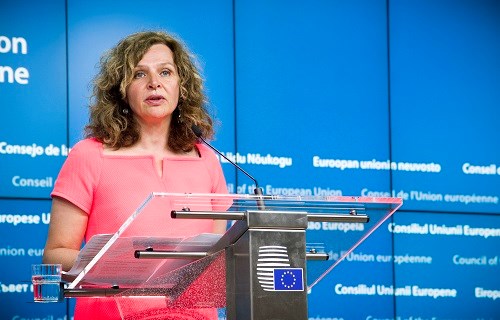EU ministers adopt good governance recommendations on major sporting events

Edith Schippers, Dutch Minister for Health, Welfare and Sport at the EU Council meeting. Photo: The European Union
03.06.2016
By Play the GameAt a meeting in the EU Education, Youth, Culture and Sports Council, EU ministers responsible for sport gathered to discuss how to improve good governance in sport.
Referring to the recent and ongoing revelations of financial malpractice and corruption in international sports organisations, the ministers agreed, among other things, that governments should have a right to ensure that public funding funneled into sports organisations is used properly. And if sports organisations wish to maintain the autonomy that they have enjoyed so far, the organisations should be run in accordance with basic principles of good governance. The ministers also agreed that public authorities are responsible for supporting sports organisations and for establishing a legal framework for them to work within.
Targeting the integrity of major sport events
The ministers of sports also adopted a set of conclusions on how to enhance integrity, transparency and good governance in sport in relation to major sports events.
While the ministers stress that major sporting events can be a “positive showpiece” and assist in the development of a city or a region, they also note that there have been cases of “limited transparency” in decision-making procedures and in the implementation of good governance as well as “possibly ”over-bidding” leading to a corresponding escalation of hosting costs”. It is also noted that a number of candidate cities have withdrawn from bidding races to host these large sporting events.
In order to promote principles of good governance, the EU Council, therefore, invites member states to follow a list of recommendations. The recommendations include guaranteeing that all phases of the event are transparent, something that should include “independent reporting, auditing, evaluation and accountability”. It is further recommended that a “reliable cost-benefit analysis” is performed ahead of a bid.
The use of transparent and relevant criteria, such as the implementation of good governance principles is also among the recommendations adopted at the EU Council meeting, as is the compliance with recognised international standards. The recommendation text further suggests that public support should be conditional on the adherence to various integrity issues such as human rights principles.
Member states, the European Commission along with the international sports movement are all encouraged to “develop guiding models for public-private cooperation in the organization of major sport events at national level” and to develop a code of conduct applying to all organisations involved in hosting a major sports event. This will support the EU’s continued process of enhancing the integrity, transparency, good governance and sustainability and legacy of major sport events,” says the text outlining the outcome of the meeting.
A special focus on integrity in sport
The EU Council is currently under a Dutch presidency that has declared transparency and good governance in sport one their main priorities during their tenure.
"Sport is great fun, but only if the game is played fairly: not only on the field but also in the boardrooms of sports organizations and authorities. That is why the Netherlands presidency has made integrity, transparency and good governance in sport one of its priorities," said Edith Schippers, minister for Health, Welfare and Sport of the Netherlands and the president of the Council, according to the press release about the meeting held on 30-31 May in Brussels. As a part of the Dutch focus on good governance in sport, Schippers’ ministry has commissioned a position paper on integrity and sport events made by the Mulier Institute in cooperation with the University of Utrecht.
The text adopted in Brussels bases its recommendations on the work delivered by the EU Expert Groups on Good Governance (XG GG) and on the Economic Dimension of Sport (XG ECO).
More information
- Read a press release about the EU Council meeting
- Read more about the meeting conclusions adopted by EU ministers responsible for sport





